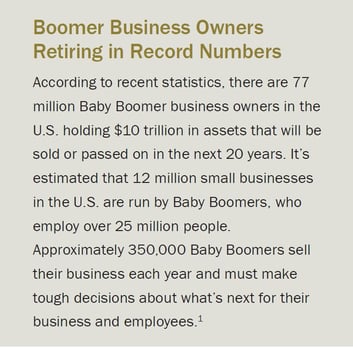4 min read
Selling a Business: Are You Ready to Sell Your Company?
 Anthony Nydegger
:
Aug 30, 2023 1:33:00 PM
Anthony Nydegger
:
Aug 30, 2023 1:33:00 PM

Your business is a big part of your life story, and many financial and personal decisions need to be addressed to determine when the time is right for you to sell your company. The process can be complex and lengthy – a sale or transition is not a simple or quick event.
As each decision you make impacts the next, it’s important to fully understand and contemplate the various options and outcomes of any business transition plan. The decisions you make during the sale of your company will affect your family for generations, your employees, and your community.
As each decision you make impacts the next, it’s important to fully understand and contemplate the various options and outcomes of any business transition plan. The decisions you make during the sale of your company will affect your family for generations, your employees, and your community.

CONSIDER THE FACTORS SURROUNDING THE SALE
As a business owner, you understand how planning and careful consideration are crucial to your company’s success.
Ultimately, your decisions affect not only your family, your employees, and their families – but also the community in which your business is located. Your business has grown and matured because of a strong culture, deep passion, and long-term view.
So how do you know when it’s the right time to sell? Transitioning or selling your company can become a complicated event that requires a great deal of forethought and consideration. Even the most successful business owners can under-estimate the factors that are required to achieve a successful sale. Here are some questions to ask yourself to kickstart the thought-process:
- Why do you want to sell or transition your business? Are you planning to retire, moving to a new town or city, looking for a different challenge, wanting to spend more leisure time with family and friends, suffering from health problems, or working through declining business issues?
- Over the years, what successes and failures have you experienced with your business? How will these impact the sale of the company?
- Have you identified any gaps in your company that you have wanted to resolve but just have not done so?
- Is your financial reporting in order?
- How do you define the value of your company, and what separates it from other businesses in the community?
- Who is your potential buyer – a family member, an employee(s), a strategic business partner, a private equity firm?
- What is your timeline for selling or transitioning your business?
- Are you emotionally equipped to exit the day-to-day routines and responsibilities of running the business? What activities will fill your day? Have you thought about your next act?
- How will you manage the proceeds after the sale is complete and you receive the funds?
- Finally, of utmost importance, what’s the status of your strategic plan and getting a team of professionals in place to foster a healthy, successful business transition?
When selling a privately owned business, it’s important to seek comprehensive advice and guidance from trusted professionals who have experience working with owners who have sold their company. Success in this regard is achieved in a similar way you created success in your company – by establishing a strong team with clear objectives and a well-constructed plan from beginning to end.
TELLING EMPLOYEES ABOUT THE TRANSITION
Confidentiality throughout the transition process is frequently important and saying too much too soon could jeopardize the success of the sale and your future plans. However, you should never lose sight of your day-to-day business operations and your relationship with your employees. The following tips may help you prepare your employees for the transition of your business to the new owner: 3
Tell employees after the deal is done. Disclosing information too soon could risk your relationships with clients and employees, as well as decrease the value of your business or finding a suitable buyer.
Inform key and senior employees first. Not everyone needs to know about the transition at the same time. Keeping top-level employees in the loop will help maintain trust and make them feel important and involved as the sale process unfolds. This will help set the stage for key employees who may be developing relationships with the new owner, and your honest, open communication may keep them from departing the company prematurely.
When you feel it is appropriate, create a communication plan for informing the rest of your employees of the business transition. Likely you will want to share your personal perspective and plans pertaining to the sale of the business, e.g., who purchased the company and why you made the decision to sell, how you envision the transition of responsibilities to the new owner, when and how you plan to step away from your day-to-day involvement with running the business, and the ways this decision may affect their jobs. Be as honest and candid as the situation will allow – employees will react differently to the news depending on individual circumstances and where they are in their careers. You also may want to:
- Discuss the new owner’s background and when the sale is effective. Explain why this buyer is the best choice for the company’s – and their – future.
- Explain to employees what will happen to their jobs once the business changes hands. (Will they be retained? Will they need to find new jobs? Will the new owner be expanding the company or hiring more people?)
- Encourage employees to continue to prosper and grow in their careers
- Thank them for their dedication, service, loyalty, and friendship. Reassure employees you will try to make the business transition to the new owner as smooth and efficient as possible.
The sale of a business is a journey. Commerce Trust can help you navigate this transition like we have for countless other business owners. We can support your business transition team and help you transition from being a business owner to making decisions and evaluating issues like a multi-generational asset manager.
By understanding your goals and objectives, we can help to chart and tailor an efficient course designed to help you realize success before, during, and after you sell your business.
Commerce Trust is here to advise you every step of the way. Contact our team of financial professionals today for guidance as you work through this important process.
Download the Article
1 Source: Yaqub M. (CBC), BusinessDIT, Marcum LLP, “Baby Boomer Business Owner Statistics 2023: The Facts and the Trends,” https://www.businessdit.com/baby-boomerbusiness-
owner-statistics/. updated April 8, 2023
2 Source: Jay Offerdahl, Forbes Financial Council, “How to Tell Your Employees You’ve Sold the Business,” https://www.forbes.com/sites/forbesfinancecouncil/2017/11/15/
how-to-tell-your-employees-youve-sold-the-business/?sh=1f7bf93873ee
The opinions and other information in the commentary are provided as of August 30, 2023. This summary is intended to provide general information only, and may be of value to the reader and audience.
This material is not a recommendation of any particular investment or insurance strategy, is not based on any particular financial situation or need, and is not intended to replace the advice of a qualified tax advisor or investment professional. While Commerce may provide information or express opinions from time to time, such information or opinions are subject to change, are not offered as professional tax, insurance or legal advice, and may not be relied on as such.
Data contained herein from third-party providers is obtained from what are considered reliable sources. However, its accuracy, completeness or reliability cannot be guaranteed.
Commerce Trust is a division of Commerce Bank.
NOT FDIC INSURED | MAY LOSE VALUE | NO BANK GUARANTEE
1 Source: Yaqub M. (CBC), BusinessDIT, Marcum LLP, “Baby Boomer Business Owner Statistics 2023: The Facts and the Trends,” https://www.businessdit.com/baby-boomerbusiness-
owner-statistics/. updated April 8, 2023
2 Source: Jay Offerdahl, Forbes Financial Council, “How to Tell Your Employees You’ve Sold the Business,” https://www.forbes.com/sites/forbesfinancecouncil/2017/11/15/
how-to-tell-your-employees-youve-sold-the-business/?sh=1f7bf93873ee
The opinions and other information in the commentary are provided as of August 30, 2023. This summary is intended to provide general information only, and may be of value to the reader and audience.
This material is not a recommendation of any particular investment or insurance strategy, is not based on any particular financial situation or need, and is not intended to replace the advice of a qualified tax advisor or investment professional. While Commerce may provide information or express opinions from time to time, such information or opinions are subject to change, are not offered as professional tax, insurance or legal advice, and may not be relied on as such.
Data contained herein from third-party providers is obtained from what are considered reliable sources. However, its accuracy, completeness or reliability cannot be guaranteed.
Commerce Trust is a division of Commerce Bank.
NOT FDIC INSURED | MAY LOSE VALUE | NO BANK GUARANTEE
